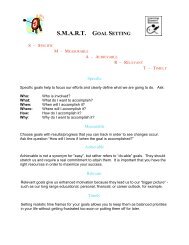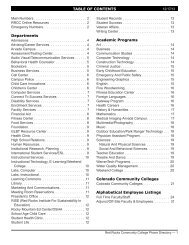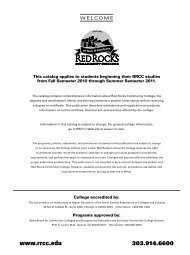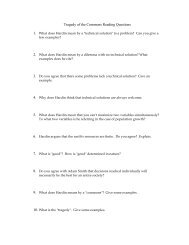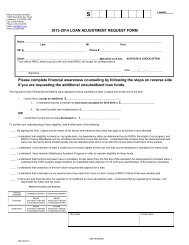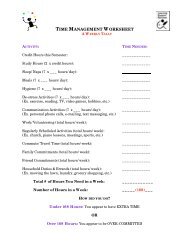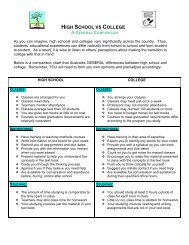opportunities, options, excellence - Red Rocks Community College
opportunities, options, excellence - Red Rocks Community College
opportunities, options, excellence - Red Rocks Community College
Create successful ePaper yourself
Turn your PDF publications into a flip-book with our unique Google optimized e-Paper software.
CAR 217 Advanced Cabinetmaking<br />
1-8 Credits<br />
Prerequisite: CAR 152 or FIW 100<br />
This course expands skills taught in CAR<br />
209. The course includes a review of the<br />
types of joints, gluing and hardware used in<br />
cabinets. The course also familiarizes students<br />
with various types and designs of cabinets<br />
used in residential and commercial construction.<br />
Construction of shop-built cabinets<br />
including a variety of door styles and the<br />
proper use of power tools for creating various<br />
designs. The uses and application of plastic<br />
laminates are explored and students learn the<br />
proper installation of shop-built cabinets.<br />
CAR 218 Commercial and Tenant<br />
Finishes<br />
1-4 Credits<br />
This course deals with dropped ceilings, steel<br />
stud partitions, estimating, scheduling and the<br />
interrelations of the mechanical trades associated<br />
in most commercial, retail and other<br />
leased spaces.<br />
CAR 220 Remodeling, Renovation<br />
and Additions<br />
1-4 Credits<br />
This course covers conversions of attic and<br />
basement spaces to usable living spaces and<br />
additions or renovation to existing structures,<br />
including kitchens and baths. Materials scheduling,<br />
estimation and construction methods<br />
are investigated.<br />
CAR 221 Building Maintenance<br />
1-4 Credits<br />
This course examines the maintenance of<br />
homes, apartments and commercial buildings—from<br />
the handyman to building superintendent,<br />
from fences and roofing repairs to<br />
plumbing and heating maintenance. This<br />
course enables students to be aware of what<br />
to expect in keeping buildings operating.<br />
CAR 223 Owner-Built Homes and<br />
Owner Contracting<br />
1-5 Credits<br />
Prerequisite: CON 151<br />
This course explores the areas of the owners<br />
making a home for themselves from inception<br />
to certificate of occupancy, owner-built or the<br />
owner as a builder and selecting contractors to<br />
perform the actual construction. The problems<br />
and common pitfalls of the owner-built<br />
home are also examined.<br />
CAR 224 Contracting and the<br />
Construction Business<br />
1-5 Credits<br />
This course is for students entering or those<br />
already in the construction industry. Job costing,<br />
overhead, insurance, when to subcontract,<br />
maintaining your own crews, cost estimation,<br />
bidding, contracts and liability are examined.<br />
CAR 225 Building Codes<br />
1-5 Credits<br />
This course covers the governmental regulations<br />
concerning building and the process<br />
through which these regulations are enforced,<br />
including whom to talk to, what to do, when<br />
to do the inspection process, how to obtain a<br />
building permit, and the process of securing a<br />
variance.<br />
CAR 227 Construction Coordination<br />
1-5 Credits<br />
This course covers the nontrade aspects of a<br />
construction project. Time, cost and labor<br />
management, as well as construction techniques<br />
are included.<br />
CAR 232 Carpentry Lab<br />
1-8 Credits<br />
Prerequisite: Permission of instructor<br />
This course allows students to specialize in a<br />
chosen area of study requiring a written proposal,<br />
plans and specifications with a particular<br />
construction project as an outcome.<br />
CAR 233 Technical Project for a<br />
Specialty Trade<br />
1-8 Credits<br />
Prerequisite: Permission of instructor<br />
This course requires students to make a written<br />
proposal to explore an area of construction<br />
through research and a project. An example<br />
of a topic might be finish flooring, with<br />
projects that resulted in installing ceramic tile,<br />
several types of carpet, sheet goods and<br />
wood-strip and parquet floorings. Upholstery,<br />
plaster covering, log cabin construction,<br />
round windows and woodcarving are all<br />
appropriate projects.<br />
CER - CONTINUING<br />
EDUCATION<br />
REFRESHER<br />
NURSING<br />
CER 200 Registered Nurse Refresher<br />
Course<br />
7 or 12 Credits<br />
Co-requisite: CHP 210<br />
Prerequisite: CPR Certification<br />
This refresher course is designed for all RNs,<br />
regardless of time absent from nursing practice,<br />
to explore avenues of employment. A<br />
portion of clinical experience is held in the<br />
hospital to refresh and update basic nursing<br />
skills. Other <strong>opportunities</strong> for clinical experience<br />
may include home health, long-term<br />
care, rehabilitation and hospice.<br />
CHE - CHEMISTRY<br />
A grade of “C” or better is required in all prerequisite<br />
courses.<br />
CHE 101 Introduction to<br />
Chemistry I (Core)<br />
5 Credits<br />
Co-requisites: CHE 101 LAB<br />
Prerequisite: MAT 109<br />
This course is for non-science majors, those<br />
in occupational and health programs or those<br />
lacking any chemistry background. The<br />
course includes measurements, atomic theory,<br />
chemical bondings, nomenclature, stoichiometry,<br />
solutions, acid and base, gas laws<br />
and condensed states. Laboratory experiments<br />
demonstrate the above concepts qualitatively<br />
and quantitatively.<br />
CHE 102 Introduction to<br />
Chemistry II<br />
(Core)<br />
5 Credits<br />
Prerequisite: CHE 101 or permission of<br />
instructor<br />
This course includes hybridization of atomic<br />
orbitals for carbon; nomenclature of organic<br />
compounds; properties of different functional<br />
groups; nomenclature of various biologically<br />
important compounds, their properties and<br />
their biological pathways. Laboratory experiments<br />
demonstrate the above concepts qualitatively<br />
and quantitatively.<br />
CHE 111 General <strong>College</strong><br />
Chemistry I<br />
(Core)<br />
5 Credits<br />
Co-requisite: CHE 111 LAB<br />
Prerequisite: MAT 160<br />
This course reviews basic chemistry: matter,<br />
chemical formulas, reactions and equations<br />
and stoichiometry. Development of atomic<br />
theory is discussed, culminating in the use of<br />
quantum numbers to determine electron configuration<br />
of atoms and the relationship of<br />
electron configuration to chemical properties<br />
of elements. Chemical bonding is covered,<br />
including valence bond theory and molecular<br />
orbital theory. The course concludes with<br />
gases, liquids and solids.<br />
CHE 112 General <strong>College</strong><br />
Chemistry II<br />
(Core)<br />
5 Credits<br />
Co-requisite: CHE 111<br />
Prerequisites: MAT 160, CHE 111<br />
General <strong>College</strong> Chemistry II emphasizes calculations<br />
and problem solving. Solutions and<br />
<strong>opportunities</strong>, <strong>options</strong>, <strong>excellence</strong> 116



